Can Justice and Fairness Enlarge International Environmental Agreements?
Abstract
:1. Motivation
2. Economic Framework
3. Policy Game: The Second Stage
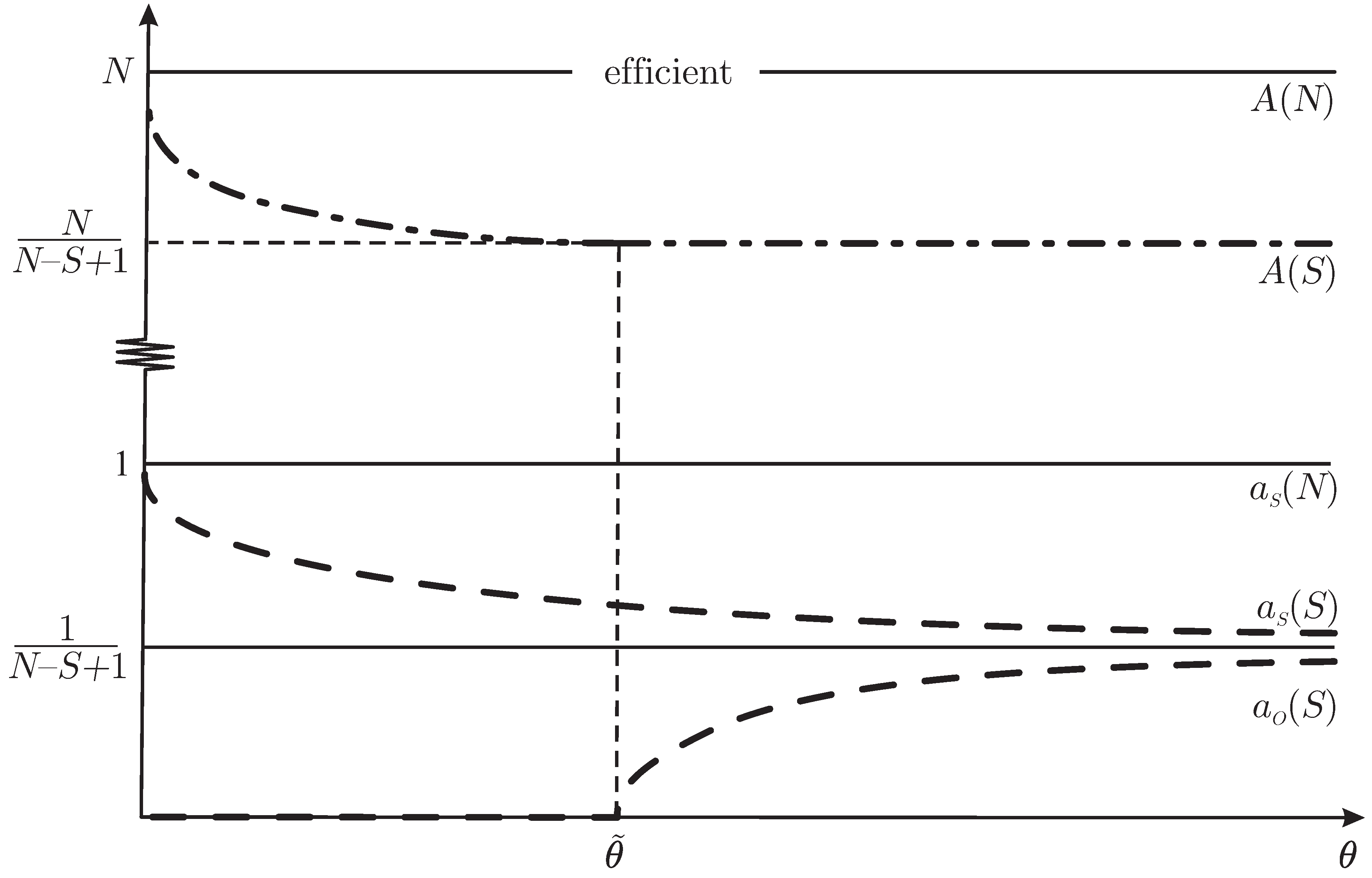
4. Signing an IEA: The First Stage
4.1. Cost Dispersion
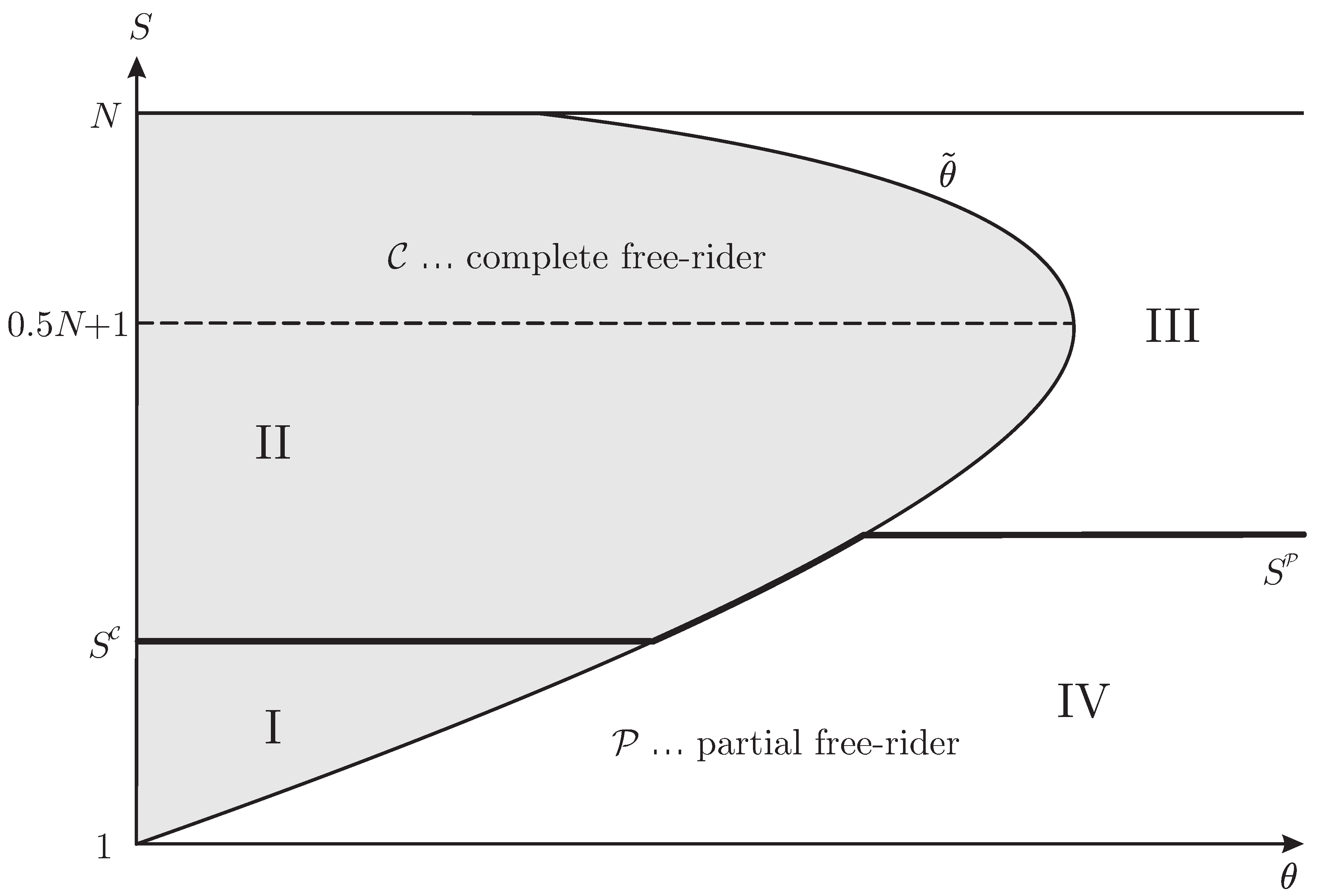
4.2. Stability Analysis
Stability Analysis for Transboundary Environmental Problems
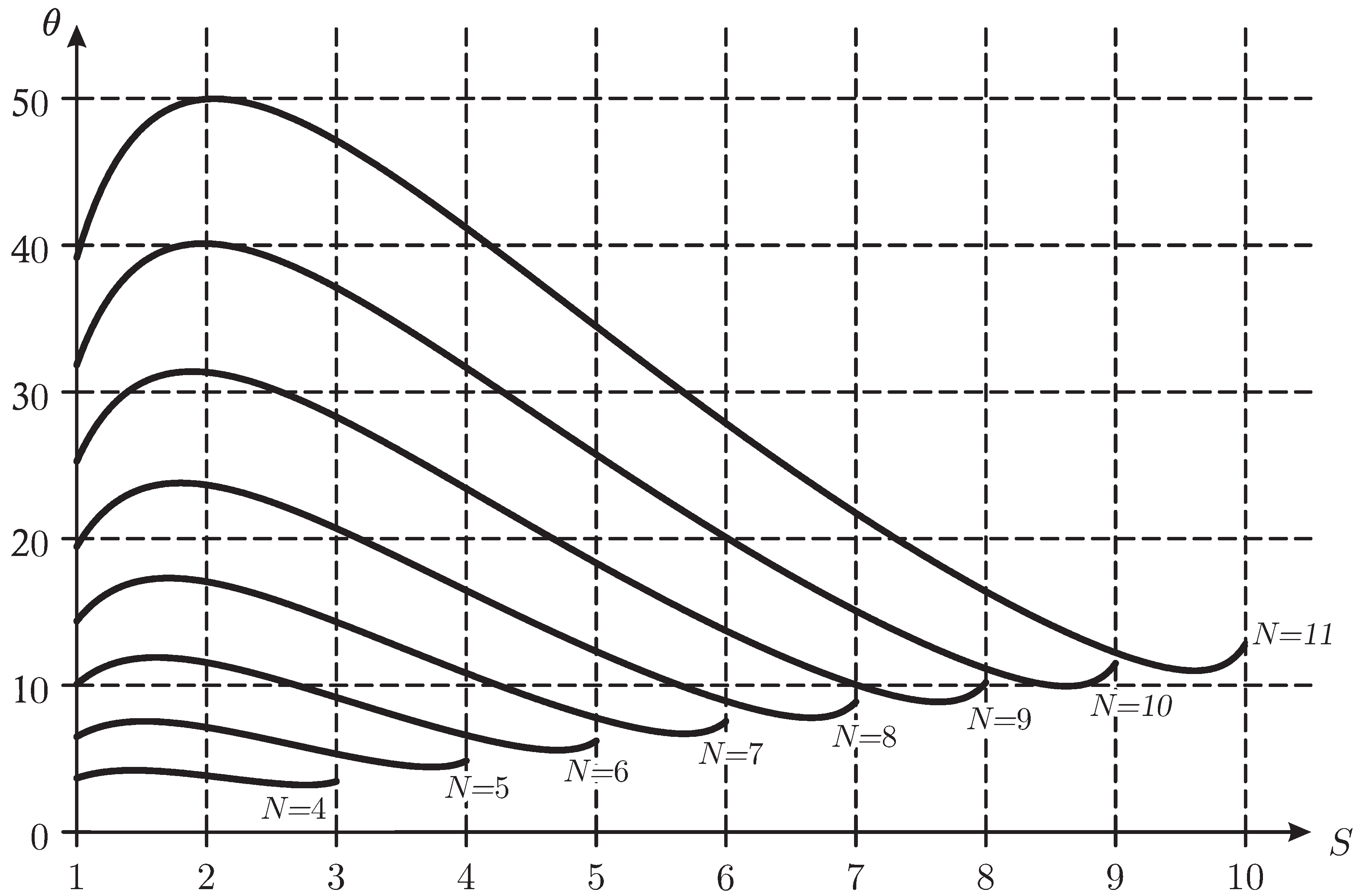
Stability Analysis for Global Environmental Problems
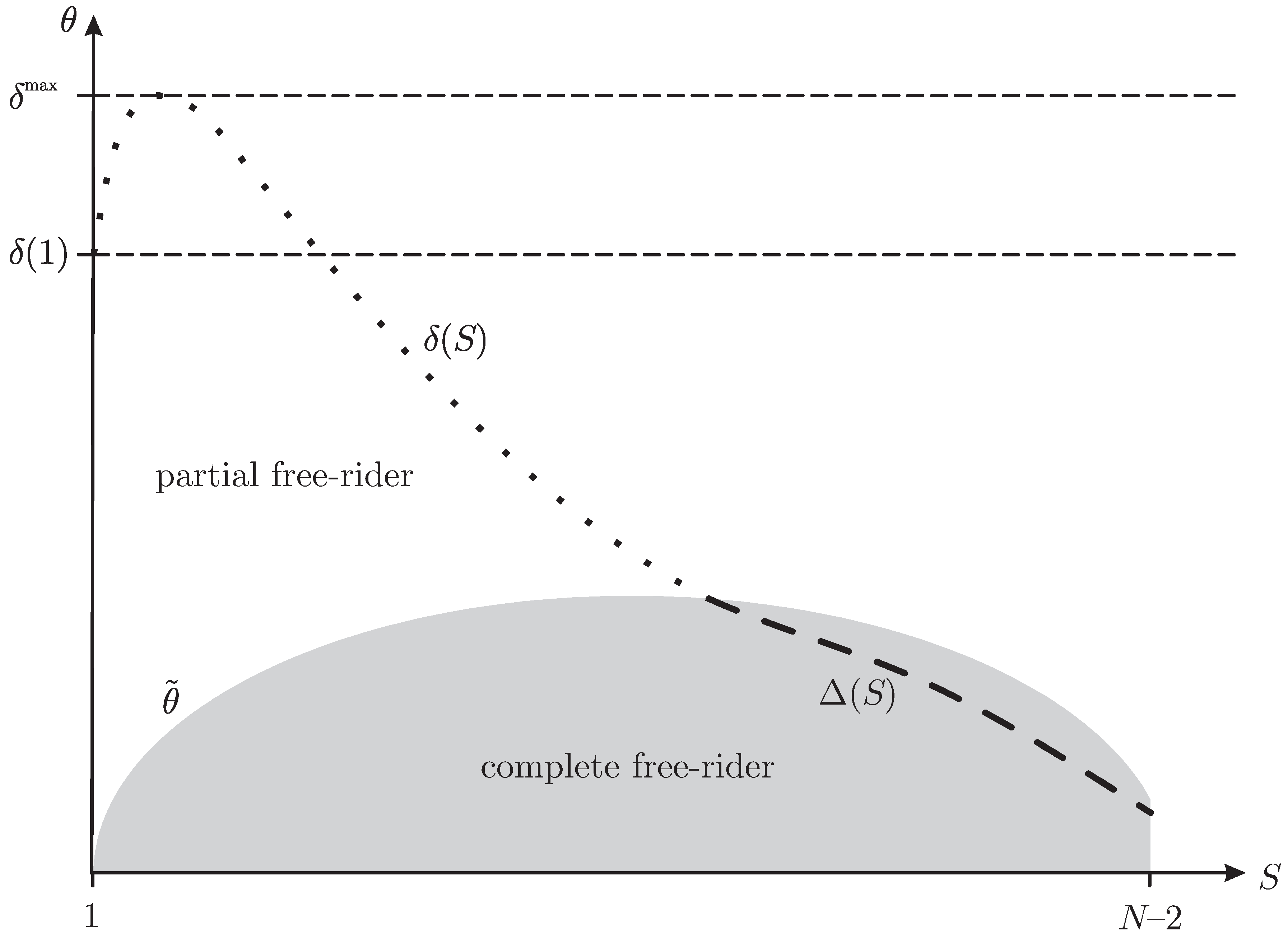
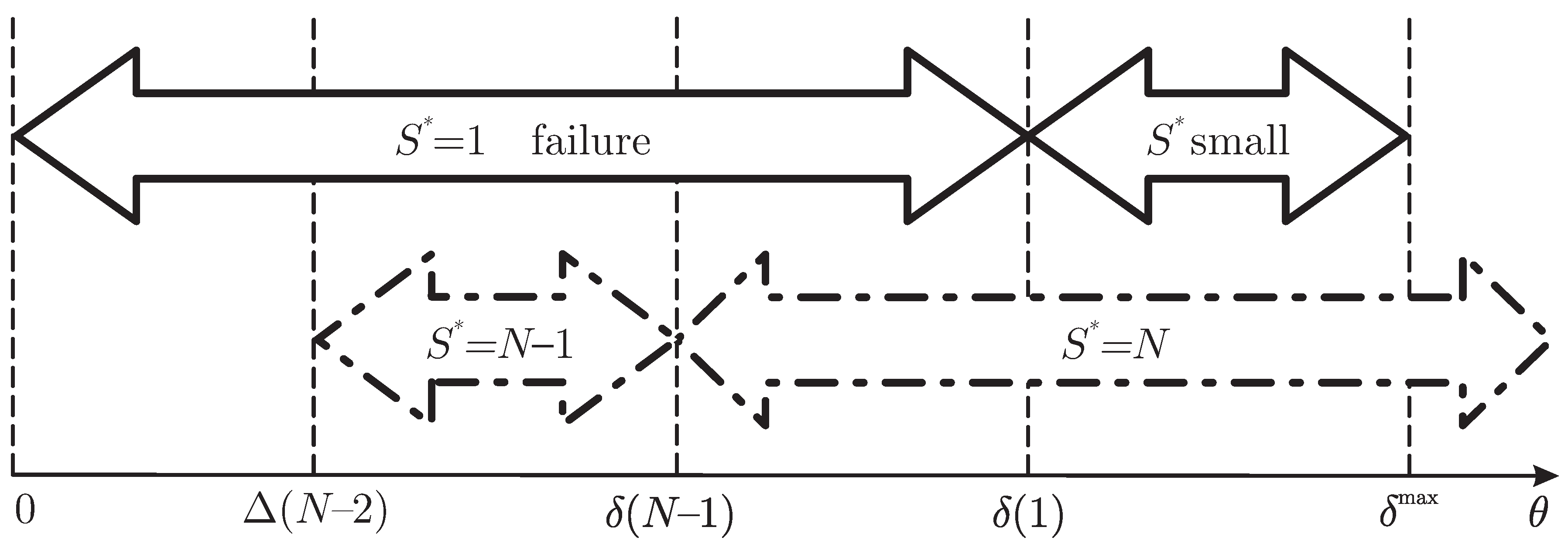
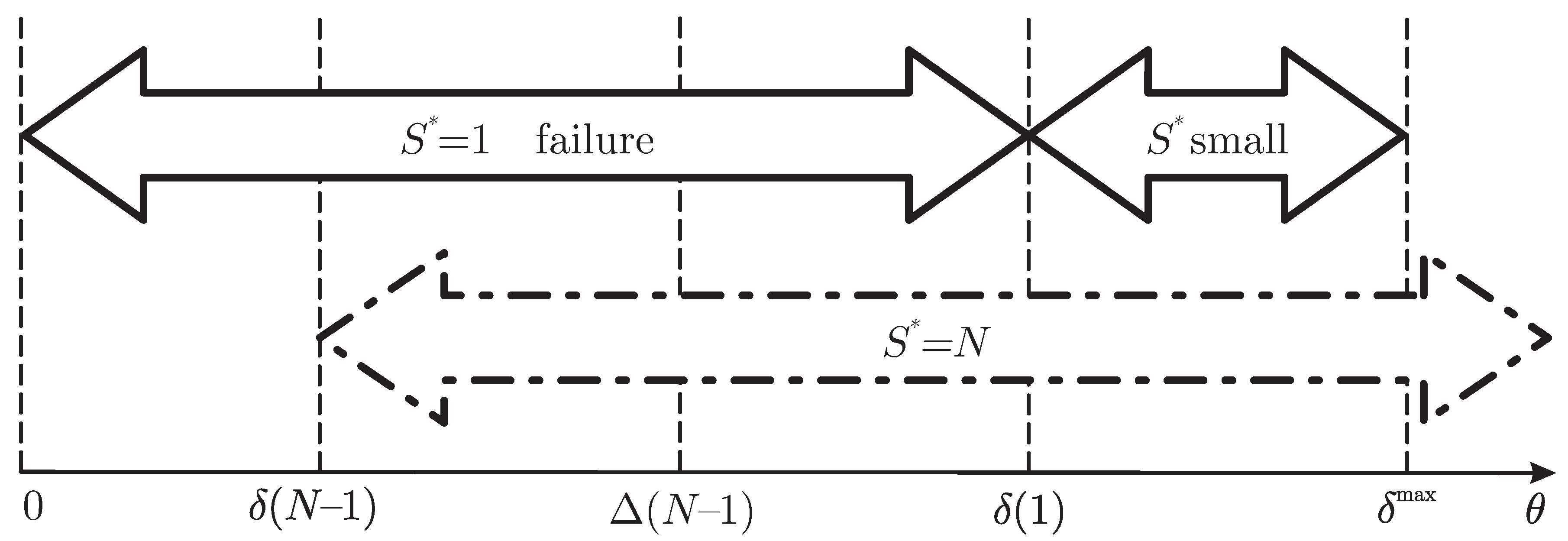
5. Extension29
5.1. Asymmetries in Measuring Equity
Priority of Countries’ Self-interest
Advantageous and Disadvantageous Inequality
5.2. Heterogeneous Countries
Different Equity Preferences
Different Abatement Costs
6. Concluding Remarks
Acknowledgements
References
- Murdoch, J.C.; Sandler, T. The voluntary provision of a pure public good: The case of reduced CFC emissions and the Montreal protocol. J. Public Econ. 1997, 63, 331–349. [Google Scholar] [CrossRef]
- Böhringer, C.; Vogt, C. Economic and environmental impacts of the Kyoto Protocol. Can. J. Economics 2003, 36, 475–494. [Google Scholar] [CrossRef]
- Böhringer, C.; Vogt, C. Dismantling of a breakthrough: The Kyoto Protocol–just symbolic policy. Eur. J. Polit. Econ 2004, 20, 597–617. [Google Scholar] [CrossRef]
- Barrett, S. International environmental agreements as games. In Conflicts and Cooperation in Managing Environmental Resources; Pethig, R., Ed.; Springer: Berlin, Germany, 1992; pp. 11–37. [Google Scholar]
- Barrett, S. Self-enforcing international environmental agreements. Oxford Econ. Pap. 1994, 46, 878–894. [Google Scholar]
- Carraro, C.; Siniscalco, D. Strategies for the international protection of the environment. J. Public Econ. 1993, 52, 309–328. [Google Scholar] [CrossRef]
- Finus, M. Game Theory and International Environmental Cooperation; Edward Elgar: Cheltenham, UK, 2001. [Google Scholar]
- Hoel, M. International environmental conventions: The case of uniform reductions of emissions. Environ. Resour. Econ. 1992, 2, 141–159. [Google Scholar]
- Barrett, S. Consensus treaties. J. Inst. Theor. Econ. 2002, 158, 529–554. [Google Scholar] [CrossRef]
- Barrett, S.; Stavins, R. Increasing participation and compliance in international climate change agreements. Int. Environ. Agreem. - P. 2003, 3, 349–376. [Google Scholar] [CrossRef]
- Buchholz, W.; Peters, W. A rawlsian approach to international cooperation. Kyklos 2005, 58, 25–44. [Google Scholar] [CrossRef]
- Stern, N. The Economics of Climate Change: The Stern Review; Cambridge University Press: Cambridge, UK, 2007. [Google Scholar]
- Alesina, A.; Angeletos, G.M. Fairness and redistribution. Am. Econ. Rev. 2005, 95, 960–980. [Google Scholar] [CrossRef]
- Bolton, G.E.; Ockenfels, A. ERC: A theory of equity, reciprocity, and competition. Am. Econ. Rev. 2000, 90, 166–193. [Google Scholar] [CrossRef]
- Falk, A.; Fehr, E.; Fischbacher, U. Reasons for conflict: Lessons from bargaining experiments. J. Inst. Theor. Econ. 2003, 159, 171–187. [Google Scholar] [CrossRef]
- Fehr, E.; Schmidt, K. A theory of fairness, competition and cooperation. Q. J. Econ. 1999, 114, 817–68. [Google Scholar] [CrossRef]
- Rabin, M. Incorporating Fairness into game theory and economics. Am. Econ. Rev. 1993, 85, 1281–1302. [Google Scholar]
- Sobel, J. Interdependent preferences and reciprocity. J. Econ. Lit. 2005, 43, 392–436. [Google Scholar] [CrossRef]
- Postlewaite, A. The social basis of interdependent preferences. Eur. Econ. Rev. 1998, 42, 779–800. [Google Scholar] [CrossRef]
- Ringius, L.; Torvanger, A.; Underdal, A. Burden sharing and fairness principles in international climate policy. Int. Environ. Agreem. - P. 2002, 2, 1–22. [Google Scholar] [CrossRef]
- Lange, A.; Vogt, C.; Ziegler, A. On the importance of equity in international climate policy: An empirical analysis. Energ. Econ. 2007, 29, 545–562. [Google Scholar] [CrossRef]
- Lange, A.; Löschel, A.; Vogt, C.; Ziegler, A. On the self-serving use of equity principles in international climate negotiations. Eur. Econ. Rev. 2010, 54, 359–375. [Google Scholar] [CrossRef]
- Albin, C. Negotiating international cooperation: global public goods and fairness. Rev. Int. Stud. 2003, 29, 365–385. [Google Scholar] [CrossRef]
- Lindbeck, A. Incentives and social norms in household behavior. Am. Econ. Rev. 1997, 87, 370–377. [Google Scholar]
- Wooders, M.; Cartwright, E.; Selten, R. Behavioral conformity in games with many players. Game. Econ. Behav. 2007, 57, 347–360. [Google Scholar] [CrossRef]
- Elster, J. Social norms and economic theory. J. Econ. Perspect. 1989, 3, 99–117. [Google Scholar] [CrossRef]
- Rege, M. Social norms and private provision of public goods. J. Public Econ. Theory 2004, 6, 65–77. [Google Scholar] [CrossRef]
- Finus, M.; Rundshagen, B. Towards a positive theory of coalition formation and endogenous instrumental choice in global pollution control. Public Choice 1998, 96, 145–186. [Google Scholar] [CrossRef]
- Hoel, M.; Schneider, K. Incentives to participate in an international environmental agreement. Environ. Resour. Econ. 1997, 9, 153–170. [Google Scholar] [CrossRef]
- Jeppesen, T.; Andersen, P. Commitment and fairness in environmental games. In Game Theory and the Environment; Hanley, N., Folmer, H., Eds.; Edward Elgar: Cheltenham Northampton, Massachusetts, USA, 1998; pp. 65–83. [Google Scholar]
- Lange, A.; Vogt, C. Cooperation in international environmental negotiations due to a preference for equity. J. Public Econ. 2003, 87, 2049–2067. [Google Scholar] [CrossRef]
- Victor, D.G.; Coben, L.A. A herd mentality in the design of international environmental agreements? Global Environ. Polit. 2005, 5, 24–57. [Google Scholar] [CrossRef]
- Rawls, J. A Theory of Justice; Revised Edition; Belknap Press of Harvard University Press: Cambridge, USA, 1999. [Google Scholar]
- Engelmann, D.; Strobel, M. Inequality aversion, efficiency, and maximin preferences in simple distribution experiments. Am. Econ. Rev. 2004, 94, 857–869. [Google Scholar] [CrossRef]
- Blanco, M.; Engelmann, D; Normann, H.-T. A within subject analysis of other-regarding preferences. Royal Holloway College, University of London, Working Paper. 2005. [Google Scholar]
- Dannberg, A.; Riechmann, T.; Sturm, B.; Vogt, C. Inequity aversion and individual behavior in public good games: An experimental investigation. ZEW discussion paper, 2007; No. 07–034. [Google Scholar]
- d’Aspremont, C.A.; Gabszewicz, J.J. On the stability of collusion. In New Developments in the Analysis of Market Structure; Stiglitz, J.E., Mathewson, G.F., Eds.; Macmillan: New York, NY, USA, 1986; pp. 243–264. [Google Scholar]
- inus, M.; v. Mouche, P; Rundshagen, B. Uniqueness of coalitional equilibria. FEEM discussion paper, 2005; No. 2005.23. [Google Scholar]
- Buchholz, W.; Grüning, C.; Peters, W. Can heterogeneous countries form homogeneous international environmental agreements? European University Viadrina, Working Paper. 2009. [Google Scholar]
Appendix: δ-Δ-function
- The numerical solution for and of the δ-function for are:
N 4 5 6 7 8 9 10 11 - For complete free-riding we have to solve by inserting the equilibrium activities (4) and (5) for Signatories’ measures and and consequently the payoff difference are implicit functions of θ and As the payoff differences can not be solved for θ explicitly a numerical solution will be used instead. This numerical solution is called Δ. A numerical solution of the above payoff difference is calculated for all integer and all applicable . As a result we obtain all θ where However, not all θ lead to Therefore, in a second step all resulting θ will be tested against the complete free-riding condition.
- 1.From a political economy perspective Böhringer and Vogt [3] argue that the rather poor results of the Kyoto Protocol can best be understood as a stance of a symbolic policy.
- 4.Cf. Alesina and Angeletos [13], Bolton and Ockenfels [14], Falk et al. [15], Fehr and Schmidt [16], or Rabin [17] and the literature cited in these papers. For a more general view on interdependent preferences and reciprocity, see Sobel [18]. Introducing justice and fairness bears the risk of modelling the extended preferences arbitrarily, as a broad range of observations can be used to explain any type of behavior, cf. Postlewaite [19].
- 5.Lange et al. [21] asked in their questionnaire for both, experts’ own view on equity as well as the perception of equity views in different countries or country groups. Nevertheless, behind the surface these fairness considerations are often driven by a material self interest, cf. Lange et al. [22].
- 6.According to Albin [23] fairness has multiple facets (e.g., altruism or reciprocity) and is not unambiguously defined. Both concepts put some pressure on governments to behave conform and thus enforce behavioral or social norms. Following Lindbeck [24] norms have an impact on rational behavior. As shown in Wooders et al. [25] self-interested behavior, conformity and social norms need not be inconsistent. This is in line with Elster [26], p. 102 who noticed that individual “actions typically are influenced both by rationality and by norms”. For more details about social norms and private provision of public goods see Rege [27].
- 7.ERC stands for equity, reciprocity and competition.
- 8.See Victor and Coben [32] for a different view of countries’ conform behavior. They suggest that quantity strategies are favored by the diplomatic community over price instruments. While equal treatment can easily be granted with the former instrument, the latter often results in heterogeneous quantity effects among countries.
- 9.This point of view directly corresponds to Rawls’ [33], p. 236 theory of justice.
- 11.There is no doubt about this statement as long as countries are symmetric or rather similar. But in real life, countries differ with respect to important variables. In case of heterogeneity, the principle of equal treatment requires that different agents must be treated differently. In an extension to our basic approach, we allow for heterogeneous countries and preferences.
- 12.Alesina and Angeletos [13], p. 965.
- 13.Alesina and Angeletos [13] apply the variance as an appropriate measure for fairness and justice. Although it seems to be obvious that a player suffers more from an inequality that is to his disadvantage, we assume—for simplicity reasons—that countries attribute a similar or the same disadvantage if they abate less or more than the others. Unless the level of abatements, coalition size and threshold for partial free-riding vary slightly, both assumptions yield to qualitatively similar results.
- 14.Most approaches analyzing coalition formation on IEAs stick either to the case where all non-signatories are complete free-rider or they assume that even outsiders do not completely refrain from environmental measures, cf. Lange and Vogt [31]. Nevertheless, free-riding depends at least on the number of already cooperating countries within an IEA. Thus, complete free-riding is not exogenous and should, therefore, be analyzed endogenously.
- 15.As we tackle global environmental problems, the number of countries involved is sufficiently large and is a rather weak assumption. If there are less than four countries there is no incentive to stay outside an IEA. However, we focus on agreements where the participation is endogenous and should therefore not be predetermined.
- 16.Contrary to Barrett [4,5] we simplify the strategic interaction between signatories and singletons by neglecting Stackelberg behavior of the coalition. Thus, we focus on simultaneously acting countries like in Carraro and Siniscalco [6]. However, as we deal with strategic substitutes, the coalition’s weak position produces a more engaged IEA. Consequently, the abatement activities of a member and an outsider are more polarized than under the Stackelberg assumption. In contrast, members of an IEA playing a leading role vis-à-vis the non-signatory states can reinforce outsiders’ abatements through a reduction in their own activities. This directly favors the member states at the expense of the outsiders. In the case of justice and fairness, Stackelberg leadership stabilizes larger coalitions even more as the economic behavior of insiders and outsiders turn out to be rather homogeneous.
- 17.For simplicity, we assume that costs are linear in abatements.
- 18.According to Rege [27] the global average can be seen as a norm for conform behavior.
- 19.This definition corresponds to that of cartel stability presented in the oligopoly literature by d’Aspremont and Gabszewicz [37].
- 20.An exception from uniqueness is given for In that case, only aggregate abatements of the non-signatory states are unique, but we have a continuum of equilibria because of quasi-linearity. To simplify the analysis, in case of we stick only to the symmetric solution.
- 22.This threshold level increases with the total number of countries, respectively. The more countries that are faced with the environmental problem, the stronger is the incentive to free-ride. Thus, partial free-riding of the outsider countries requires a relatively strong θ. If the majority of the countries behave non-cooperatively (cooperatively), an increasing number of coalition members results in an increasing (decreasing) threshold level, .
- 24.This result is in contrast to Hoel and Schneider [29], who extended governments preferences so that becoming an IEA member is an end in itself and encourages participation independent of coalition size under pure selfishness.
- 25.The numerical solution for and of the δ-function for is presented in the appendix.
- 26.This complements Lange and Vogt [31], who neglected the endogeneity of these types of free-riding.
- 27.The implicit Δ-function and its numerical solution are presented in the appendix.
- 28.In the case of complete free-riding a non-signatory’s choice is restricted to Hence, the gain from free-riding becomes smaller than for interior abatement strategies. As free-riding behavior changes from to this stabilizes the all-but-one coalition.
- 29.We owe this section to a hint of the anonymous referee who suggested to abandon the strong assumption of symmetry in countries as well as in symmetry of inequality aversion.
- 30.The case corresponds to the previously analyzed model with symmetric equity preferences.
- 31.In contrast to the former assumption the deviation of a specific group and not only that of a single country counts differently.
- 32.The impact of disadvantageous inequality for can be modeled similarly.
- 33.See Lange and Vogt [31] for an similar analysis of the extreme case in which countries are either interested in their absolute payoff or exclusively in equity .
- 34.See Buchholz et al. [39] for a stability analysis of self-enforcing IEAs for heterogeneous countries which differ in their abatement costs.
© 2010 by the authors; licensee MDPI, Basel, Switzerland. This article is an Open Access article distributed under the terms and conditions of the Creative Commons Attribution license (http://creativecommons.org/licenses/by/3.0/.)
Share and Cite
Grüning, C.; Peters, W. Can Justice and Fairness Enlarge International Environmental Agreements? Games 2010, 1, 137-158. https://doi.org/10.3390/g1020137
Grüning C, Peters W. Can Justice and Fairness Enlarge International Environmental Agreements? Games. 2010; 1(2):137-158. https://doi.org/10.3390/g1020137
Chicago/Turabian StyleGrüning, Christine, and Wolfgang Peters. 2010. "Can Justice and Fairness Enlarge International Environmental Agreements?" Games 1, no. 2: 137-158. https://doi.org/10.3390/g1020137
APA StyleGrüning, C., & Peters, W. (2010). Can Justice and Fairness Enlarge International Environmental Agreements? Games, 1(2), 137-158. https://doi.org/10.3390/g1020137



